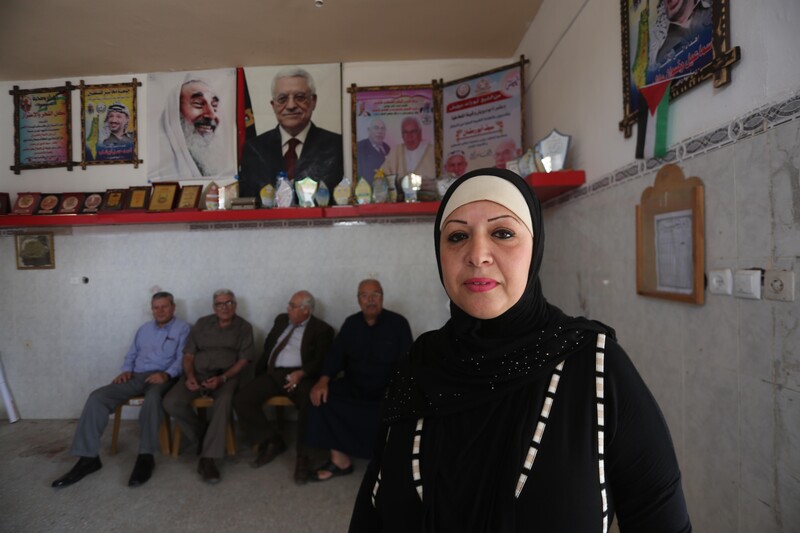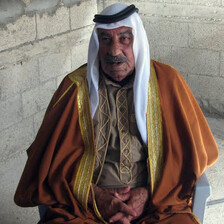The Electronic Intifada 25 September 2017

Ulfat Anbar, known as Um Rashid, has achieved success, and met with some resistance, as a family mediator in the Gaza Strip.
The Gharibs had a problem. Their son, Rami, 24, was under arrest after a bitter divorce saw a local court demand he pay his ex-wife a monthly allowance he could not afford.
The only way out for the family, from the Jabaliya refugee camp, was to seek mediation between themselves and their erstwhile in-laws. For help, the Gharibs turned to Um Rashid.
“For over three months and with the intervention of various local men of reconciliation, we were not able to bridge our differences. That was until Um Rashid showed up,” Mahdi Gharib, Rami’s eldest brother, told The Electronic Intifada.
Calling her the mukhtara (the feminine form of the masculine mukhtar, or family chief), Mahdi detailed the standoff that Um Rashid – at the suggestion of the police – helped resolve.
“When I contacted the mukhtara, she promptly intervened with Rami’s ex-mother-in-law,” said Mahdi. “In less than one day, the mother-in-law agreed to the divorce, after they agreed that my brother would give back jewelry that had been given as dowry and spend a certain amount of money on their 2-year-old son every month.”
The “social reconciliation lady”
Um Rashid, also known as Ulfat Anbar, is one of a small number of women in the occupied Gaza Strip who are acting as mediators in family disputes, a role that has typically fallen to men.
Though their role is controversial, a dramatic increase in the number of divorces, and subsequently of women fending for themselves, is necessitating a deviation from customary methods of mediation.
Anbar got involved in the resolution of various family disputes across Gaza as a result of her affiliation to the Association of Family Chiefs – a grouping of mukhtars that mediate family arguments – in Gaza City.
Speaking to The Electronic Intifada at her family home in the Nasser neighborhood of northern Gaza City, Anbar, 48, said her role as a “social reconciliation lady” – this is how she prefers to be described – was partly informed by personal experience.
“Back in the 1990s, I was close to divorce. At the time, I was shuttling between Gaza and Saudi Arabia with my then small children. But, though my problems were quite pressing, I decided to maintain my marriage for the sake of my children,” Anbar recalled.
Later political involvement also helped improve her ability to communicate with different people, she said. For over 15 years, Anbar was secretary of the Palestinian People’s Party, the communist party, in the Sheikh Radwan neighborhood of Gaza City.
“My work with that committee boosted my social skills and introduced me to many in the local community.”
She began her connection with the Association of Family Chiefs in 2016. And over the past year-and-a-half, Anbar said, she has helped mediate more than 35 family disputes, mainly divorce cases.
Anbar now spends much of her week outside her home helping others solve their problems.
“It is important to me. I thrive on helping people resolve their problems,” Anbar said. “I strongly believe in the blessings I might get from doing so, a conviction based on our Arab and Islamic traditions.”
Her family – husband and four grown children – has no objections, even if they are at times wary when the conflict resolution takes place at home. Reem Anbar, 27, said her mother had the family’s full support.
“We only object sometimes, when individuals come to our home for mediation,” Reem said.
Upending tradition
The role of family mediator is customarily one reserved for men and specifically mukhtars, and the rise of Anbar and women like her has met some resistance in Gaza.
Both Tawfiq Abu Ghraiban of the central Gaza Strip and Mahmoud Thabet of the northern Gaza Strip, leading mukhtars, agree that women have a valuable role to play in family mediation.
“A woman’s role in reconciliation cannot be denied,” said Abu Ghraiban, a Bedouin mukhtar from the Nuseirat refugee camp in the central Gaza Strip. He offered the example of his 85-year-old mother, who helps him when women need to give intimate testimony that customarily only another woman can hear.
“In these instances, my mother is the only one who can either listen to these women or understand any possible injuries they have suffered,” Abu Ghraiban said. “Only after that can I, as a judge, pass judgment.”
“I would agree to a certain extent to the role of women in solving some disputes,” Thabet also acknowledged, “a role that is similar to what Um Rashid is doing.”
However, Thabet said that role had to be limited and that some gender separation had to be maintained.
“I would disagree with women participating at public reconciliations in which men are involved,” Thabet said. “A woman like Um Rashid can be summoned in certain cases, to hear a female witness or to investigate certain evidence that pertains only to women.”
Thabet also took issue with the mukhtara designation.
“I totally disagree with the name mukhtara. This implies that a given family has chosen this person to represent them and this does not apply to Um Rashid or women in general,” he added.
Outside mediation
The role of outside mediation, particularly in family disputes, has a long tradition in Palestinian society and is one that is encouraged by officials and police.
Imad al-Amasi, head of the public relations department of the Gaza police, said officers benefit from cooperation with local mukhtars.
“Our main purpose for such an interaction is to solve disputes away from the official legal system. This is helpful in a conservative Arab community,” al-Amasi said.
He also suggested it relieved police of a burden exacerbated by the 10-year-old Israeli economic blockade of the coastal strip. “We receive 20-25 complaints a day across the Gaza Strip, and the majority of those problems are finance related.”
Hasan Nasrallah, a family law attorney, told The Electronic Intifada that existing laws also give some priority to outside reconciliation.
In some family disputes, a court judge will invoke laws that refer parties to outside mediators rather than detain them, at least in the first instance, Nasrallah said. This is a legal practice that goes back a century to the British colonial mandate in Palestine.
The actual practice of familial or tribal reconciliation goes back centuries. Nasir al-Yafawi, a historian, believes that the role of the mukhtar has waned over the past two or three decades.
“Consecutive central governments in Palestine have always honored the process of local reconciliation away from regular legal procedures,” al-Yafawi said. “But with the intervention of political parties, particularly reconciliation committees affiliated to such parties, traditional reconciliation has become less efficient.”
For instance, al-Yafawi said, in Gaza, the Hamas government favors reconciliation committees that belong to the Palestine Islamic Scholars Association and in general a mukhtar’s influence can now be connected more to the particular political party he belongs to rather than his position as head of a family.
Growing role for women
While traditional mukhtars have reservations about the growing role of women in mediating family feuds, some Islamic scholars are more open to the practice.
Ashraf Salama, a preacher from the Nuseirat camp, said Islamic Sharia law allows room for women mediators equally to men.
“I agree with women working in reconciliation and this is something accepted by the Islamic faith,” Salama told The Electronic Intifada.
And more women are training as mediators. Over the past five years the Palestinian Center for Democracy and Conflict Resolution, a human rights organization in Gaza, has been organizing training courses on conflict resolution skills specifically for women.
According to Samar Hamad, a counselor with the center, the courses have been popular. She said the two annual courses the center offers are fully subscribed with 30 women in each.
Candidates are chosen according to very specific criteria: Trainees need to be over 40, educated to university degree level and of general good standing in their communities.
According to Hamad, in addition to Anbar, three other women perform a similar mediating role in the Gaza Strip. But many more are needed, she said, because of the rising rate of divorce in Gaza.
“The existence of these ladies is important these days as the number of family problems, mainly between married couples, has increased.”
In 2016, according to the Supreme Sharia Judicial Council, there were almost 3,200 divorces, up from about 2,600 in 2015, or an increase of a fifth.
It is in part this growing need that spurs Anbar.
“Many divorced women are exposed to violence and harassment,” Anbar told The Electronic Intifada. “I dream of having a special center that provides care for such women: shelter, counseling, medical and social care, as well as some kind of entertainment.”
Rami Almeghari is a journalist and university lecturer based in the Gaza Strip.





